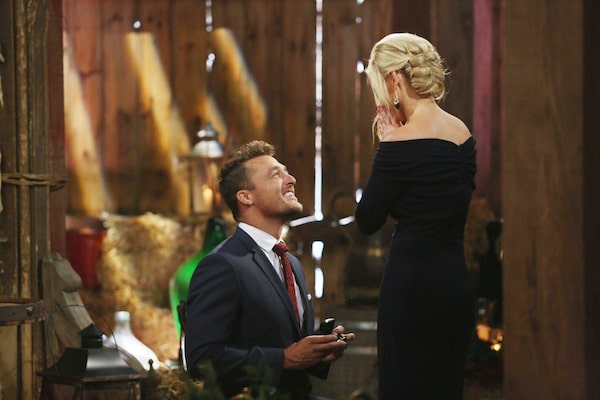
Chris Soules, left, proposed to Whitney Bischoff at the end of Season 19 of The Bachelor. Like many of the relationships formed on the show, shortly after the cameras stopped rolling Soules and Bischoff broke up.
Bachelor Nation: Inside the World of America's Favorite Guilty Pleasure
By Amy Kaufman, Dutton, $34
Most Dramatic Ever: The Bachelor
By Suzannah Showler, ECW Press, $12.95
My name is Cliff and I'm a member of Bachelor Nation. A few times a year, for weeks at a time, usually on Monday nights at 8, I gather with my wife and friends. I pour very generous glasses of red wine and we settle in for multiple hours of The Bachelor – or The Bachelorette, or Bachelor in Paradise or, most recently, The Bachelor Winter Games.
Why we watch is a no-brainer that cuts across the reality-television spectrum, whether your poison is The Bachelor, the Kardashians or The Voice. They're emotional, they're entertaining and they go down very easily with that glass of wine.
But how we watch, along with millions of other viewers, is the subject of two new books by Amy Kaufman and Suzannah Showler. They take radically different approaches to unpacking what makes the reality franchise tick.
On one hand is Kaufman's doggedly reported account of what really happens behind the scenes of a production loath to let outsiders know how their soapy sausage is made. On the other is Showler's philosophical meditation on the show's value system and its reflection of our own lives. (I feel as if they should have a long-distance chat about things from their respective ends of the universe.)
Read together, they are essential to a better understanding of one of the most popular, longest-running shows of the past decade and a half. For a fan such as me, Kaufman and Showler collectively make me question, in Bachelor vernacular, whether I'm truly "here for the right reasons."
What was TV life even like before The Bachelor? Sixteen years and 35-plus seasons later, even haters of the show and its spinoffs should be familiar with the basic formula: Two dozen-plus eligible men or women vie to be the last lover standing before the star bachelor or bachelorette. Sometimes there is a proposal, sometimes not. You can count the number of Bachelor couples who are still together on one hand.
We all know there are innumerable issues with the show, from its token treatment of contestants of colour to – despite the drinking and implied promiscuity – its ultimately conservative notion of heterosexual monogamy. Even in seasons of The Bachelorette, the winning man gets to reclaim his traditional narrative and propose to the female suitor.
Yet I, my wife and friends continue to watch week after week. We've forgotten more porcelain, doe-eyed hopefuls from the Midwest than we care to remember. But while the show is on, Bekah M.'s every mascara-tinged tear means everything.
Kaufman lets us in on the ridiculous world that manufactures those tears for our entertainment. Despite a lack of access to the current producers, who've banned her from attending official show events, she is able to confirm in great detail what fans could before only infer. The set is, indeed, a booze-fuelled atmosphere where producers goad and interrogate sleep-deprived contestants until they get the reactions needed for good TV. They are also armed with detailed personal histories and psychological profiles so that if, for example, you are afraid of heights – expect to be sent on a skydiving date.
Elsewhere, editors do take extreme liberties in postproduction. One cruel anecdote came from contestant Clare, who tells Kaufman about meeting the editor who copped to splicing a conversation to appear as if she were talking to … a raccoon.
(My personal favourite facts: Contestants do their own laundry, apply their own makeup and cook their own food. Have you tried being filmed 24/7 while waiting for your morning coffee?)
The revelations go on. Bachelor Nation will resonate most with the parts of Bachelor Nation that thrive on one basic assumption: all The Bachelor's a stage. And if, like me, you believe in the artifice of the show, then the most interesting parts of it are those that Kaufman so valiantly uncovers.
The book is a natural complement to an unbeliever's bookmarks of weekly spoilers from realitysteve.com, real-life Bachelor gossip from people.com and the Instagrams of contestants who've successfully turned TV notoriety into social-media fame.
Showler's perspective quickly made me reconsider the unbridled glee I took in Kaufman's reporting. She states outright that she never intended to contact producers or participants. Instead, Showler rewatched most of the Bachelor archive in order to better understand the secret life of the show.
To read Showler, a self-professed Bachelor-believer, you need a different assumption: that the emotions involved are authentic enough. Even if there are producers, alcohol and closed-set stir-craziness involved, which she alludes to, there is a truth to the performances that should be acknowledged.
Contestants are, actually, telling true stories about themselves on TV. And, as Showler notes, often sad ones: cancer-ridden alcoholic fathers, a childhood friend killed by a falling tree, war veterans with PTSD – but to date, never sexual assault, a clear signal of the show's continuing challenges with feminist sentiments.
The warped part that makes many of us miss the emotional resonance of these stories is their delivery. They are almost always in service of the show's stated end prize of true love. Somehow, The Bachelor has commodified trauma into currency to prove a person's character worthy of soldiering on to next week's episode.
The introspection of Showler's work made me reconsider another finding of Kaufman's. Many contestants told her how the cloistered environment eventually made them act out. You plan to not get drunk, but when drinks are splayed everywhere… ; you don't want to cry, but when you haven't spoken to friends or family in weeks…
There are many reasons to treat it all as pure entertainment to ridicule at will. There are just as many reasons to reconsider the humanity involved in producing reality TV. The Bachelor, Showler writes, is "a show that has always pretended to be about the production of fantasy, but is really about how people make do – how they maintain the scraps of their humanity, how they make difficult life choices – under inadequate conditions."
Consider me a reformed Bachelor watcher. A few times a year, for weeks at a time, usually on Mondays at 8, I'll still gather with my wife and friends. I'll pour very generous glasses of red wine.
And I'll know for sure: Yes, I am here for the right reasons.
Cliff Lee is The Globe and Mail's Books editor.
Hilary Clinton reads excerpt from controversial book Fire and Fury at Grammy Awards.
Reuters
 Cliff Lee
Cliff Lee